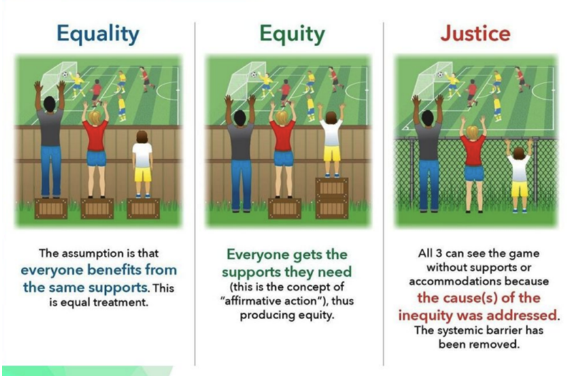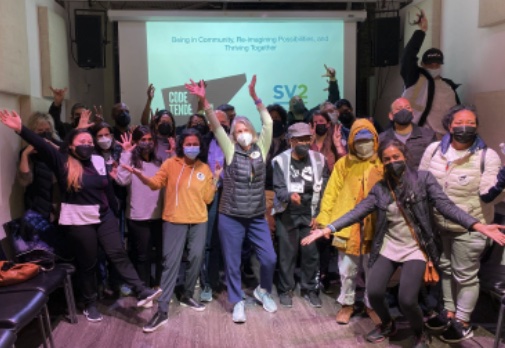College is Real (CIR) provides guidance and tools for “college-aspirational” students at Richmond’s three public high schools in order to have as many students as possible apply to, attend, and graduate from four-year colleges. CIR wants to change the lives of the students in the program so they can ultimately improve the lives of their families and change their communities.
Redwood City Police Activities League (PAL) joins police professionals and community members in a unified effort with a mission to provide school-age children and their families with access to academic support, life skills and personal development activities, with a focus on producing successful opportunities for underrepresented and underserved communities throughout Redwood City.
In our Equity in Education Grant Round, we had a “Chat with Youth” and other changemakers and leaders to learn more about what equity in education means, sourced organizations to consider based on community nominations, and engaged current Community Partners / Grantees in our organization shortlisting process. We selected these two deeply successful and growing organizations to each receive $125,000 in multi-year unrestricted funding, beyond-the-dollars support as helpful, and friendship!
More about the selected organizations:
College is Real
Founded in 2005, College is Real (CIR) provides guidance and tools for “college-aspirational” students at Richmond’s three public high schools in order to have as many students as possible apply to, attend, and graduate from four-year colleges. CIR wants to change the lives of the students in the program so they can ultimately improve the lives of their families and change their communities.
CIR provides academic counseling, application assistance, college tours, community service, scholarships, test prep, tutoring, mentoring, summer bridge program, and career education. College is Real wants to change the lives of the students in the program so they can ultimately improve the lives of their families and change their communities.
College is Real serves 430+ students in the program, both male and female, predominantly LatinX and African American students, which is consistent with demographics of communities and schools they serve. Richmond has the lowest high school graduation rate and the highest poverty rate of any city in the Bay Area. They hope to grow to 500+ high school students by 2023 and are well on their way to that goal in spite of setbacks with COVID.
Angelica Arriaga, Executive Director, is a charismatic and focused leader who was born in Lynwood, California, raised in Riverside, California, and is the first in her family to attend and graduate from a four year university. Angie impressed our Partners with her passion and talented leadership in providing direct services to the students to ensure that they become the first in their families to go to college and how she is the students’ trusted academic / college advisor.
Redwood City PAL
Founded in 1995, Redwood City Police Activities League (PAL) joins police professionals and community members in a unified effort with a mission to provide school-age children and their families with access to academic support, life skills and personal development activities, with a focus on producing successful opportunities for underrepresented and underserved communities throughout Redwood City.
PAL’s programs with kids and adults focus on community care and enrichment, healthy lifestyles, and city initiatives. This includes after-school and summer camp for youth ages 5-13, healthy lifestyles initiatives such as community sports and fitness classes, toy drives, a cadet program, and a tattoo removal program.
PAL serves 400 school children annually, and has served 15,000 children and youth since its founding in 1995. 98% of their clients are Latinx. They provide programming on Zoom for busy families, and also at their facility in North Fair Oaks and at three schools in the Redwood City School District.
Ivan Martinez, Executive Director, is a dynamic and collaborative leader who was born and raised in North Fair Oaks. He has deep ties and passion for the community, and impressed our Partners with his collaborative approach, equity commitment, and leadership not only in direct services to youth, but also in systems change work like fostering community dialogues with the police department.
More about our learning, community engagement, and grantmaking process:
In our Equity in Education Grant Round, we had a “Chat with Youth” and other leaders to learn more about what equity in education means, sourced organizations to consider based on community nominations, and engaged current Community Partners / Grantees in our organization shortlisting process. We selected these two deeply successful and growing organizations to each receive $125,000 in multi-year unrestricted funding, beyond-the-dollars support as helpful, and friendship!
Here are some of our key takeaways about equity in education principles and practices (and we keep learning and growing!):
- Access and Opportunity:
-
- Equal opportunity and equal access to learning and resources
- A fair first chance
- Every student can thrive and realize their full potential
- Accepting that people have different paths in life
- The chance to explore passions in nontraditional subjects and connect with the real world
- Self advocacy
- School Culture:
- Welcoming and belonging
- Activate students to think about and change their systems (in a paid way)
- Committed and dedicated teachers who care about student success and students as people
- Community Support:
- Social mobility
- Prioritizing mental health
- Having sufficient funding throughout schools and districts
- Anti-Racism, Diversity and Representation
- Having knowledge of selfhood and ways in which our selfhood has been shaped by who we are as a nation
- Being socially accepting and more inclusive
We also further applied our knowledge of key success factors in our education system:
1) Expanded Learning/OST
2) Social-Emotional Learning/Mental Health
3) Family/Parent Engagement
4) Teacher Development
5) Community Power Building/Policy Advocacy
Thanks to all who participated, and special kudos to Jennifer Min and Kelly Pope, Partner Co-Leaders of the Grant Round for their thoughtful re-design, community listening and grounding, and gracious facilitation, all as volunteers of this massive effort!

 This past February, we got together in-person with
This past February, we got together in-person with